Specially trained primary healthcare workers empower patients to change their behaviour
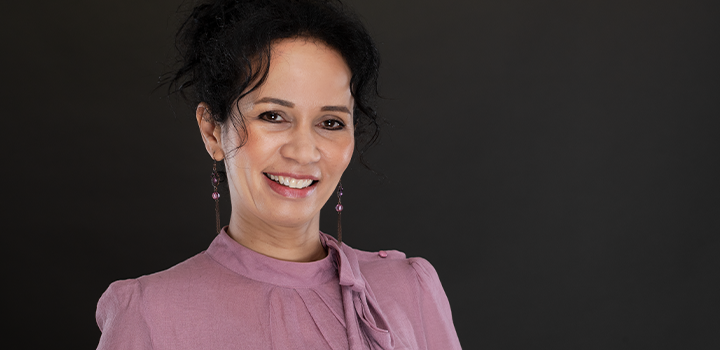
Specialist family physician, health educator, and PhD candidate, Dr Joleen Cairncross, pilots a patient-empowerment and healthcare worker education project in the disadvantaged communities of Cloetesville and Delft in the Western Cape.
Dr Joleen Cairncross dreams of a two fold strategy to change the way we practise medicine in primary healthcare. She is passionate about empowering patients with knowledge to manage their health better, and training healthcare providers in primary care facilities to teach patients how to do this.
She is living up to this dream with her pilot project and research out of the University of Stellenbosch and its Tygerberg Hospital campus – a dream that has earned her a 2019 Discovery Foundation Academic Award.
Her project has huge potential. Through it she hopes to implement a comprehensive approach to patient education and counselling in primary healthcare for non-communicable diseases.
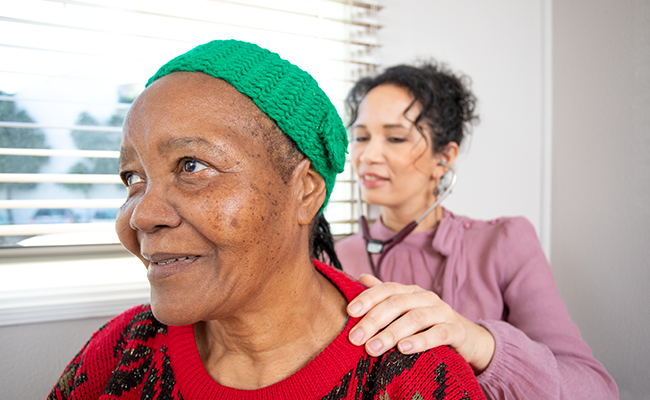
Humble beginnings inspire a love of helping people
Dr Cairncross is no stranger to adversity and her experiences have driven her to make a difference. “Every day the thought crosses my mind that I want to help people,” she says.
She grew up in the low-income suburb of Uitsig, and later Mitchells Plain on the Cape Flats. “My dad is a priest in the Reformed Old Apostolic Church and my mother a housewife dedicated to her family and church. We were always busy with church and community activities, and at school I was part of a drug action committee and very socially involved,” she says.
She was head girl at the Malibu Secondary School in Blue Downs and the top student in matric, despite being involved in a serious vehicle accident that year where she narrowly escaped paralysis.
She graduated from the University of Stellenbosch with her MBChB, studied Family Medicine, and earned her Master’s in Health Professions Education at the University of the Free State.
Dr Cairncross then worked for about seven years as a junior lecturer, medical officer, GP locum, and academic coordinator.
In 2014, during her family medicine training, Dr Cairncross lost her life partner and medical colleague in a vehicle accident. She has since raised her teenage son on her own.
Ever the innovator
While at the University of the Free State, Dr Cairncross earned awards and recognition for her research into innovative ways to improve the quality of healthcare in disadvantaged communities.
However, despite her flourishing medical career in the Free State, she decided to uproot herself and return home. “My career needed a different challenge,” she explains.
In August 2018, she was back in Cape Town living in Durbanville and doing project management and research at the Tygerberg campus.
Her mentor on the Bloemfontein campus, Family Medicine Senior Specialist, Professor Dirk Hagemeister, says, “In my eyes she has great potential as a leader in society, service delivery, and academia. I wouldn’t hesitate to have her continue working with us.”
Dr Cairncross responds, “He role-modelled all of these qualities. I learned from the best.” She attributes her passion for research to another mentor and teacher at the Bloemfontein campus, Professor Hannes Steinberg.
Closing the non-communicable diseases tap
She now pilots a patient-empowerment and healthcare-worker education project in the disadvantaged communities of Cloetesville and the slightly more distant Delft.
The project takes on the four most rife and debilitating non-communicable diseases by training healthcare workers in brief behaviour-change counselling, and facilitating group education sessions with patients.
Dr Cairncross supports and trains eight healthcare workers from the Cloetesville Community District Clinic and 12 from the Symphony Way Clinic in Delft. All of them routinely treat patients with non-communicable diseases.
She says a typical work day in a chronic care clinic can involve each healthcare worker seeing up to 40 patients. Due to time constraints, patients don’t learn how to self-manage their chronic conditions.
A new way to practise medicine
By training groups of 10 to 15 patients with type 2 diabetes, asthma, chronic obstructive airway disease, and hypertension, healthcare workers in Dr Cairncross’ programme will significantly influence morbidity and mortality.
“We’re focusing on the uncontrolled, newly diagnosed, and non-adherent patients; starting with diabetes patients, before moving to groups suffering from the other chronic conditions,” she says.
“It’s a new way to practise medicine, doing interventions with the patients instead of to them. The results are already showing, although my PhD won’t focus on the clinical outcomes as much as the efficacy of implementation,” she adds.
The Provincial and National Department of Health keenly follow her work. She stresses that in the wider context in South Africa, with its ranking as the unhealthiest nation on earth, diabetes is the biggest killer of women from disadvantaged communities. Non-communicable diseases account for 57.4% of all deaths in South Africa.
Sub-Saharan Africa is undergoing rapid epidemiological transition as the rising burden of non-communicable diseases collides with existing chronic infectious diseases, such as HIV and tuberculosis.
Getting healthcare workers to change the way they work is often the biggest challenge. “Initially, they tend to see it as adding more work to their already heavy loads, but we help them see the potential of a very different ending,” says Dr Cairncross.
Her trainees’ patient-led guiding style is far more effective than the ‘doctor-says-so’ top-down approach. “We ask what patients think about the information we provide and how they could do things differently to improve their health,” she explains.
If she had a magic wand to wield? “I would take it back to the basics of how we train healthcare workers in communication skills and patient-centred care. Imagine if you had family physicians at clinics backed by medical officers. It could reduce the burden on specialist clinics. Imagine a primary healthcare practitioner with an interest in just one specialist discipline – how they could probably reduce referrals by 50 to 100 each month!”
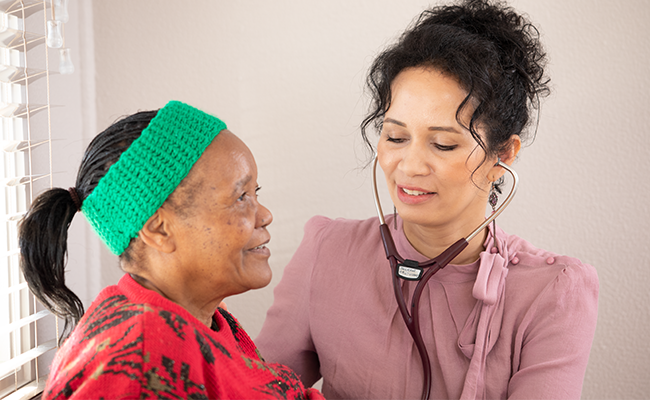
Empowering patients, reducing healthcare workload
According to Dr Cairncross, people tend to do unstructured, ad hoc patient counselling. There are pamphlets, guidelines, and booklets; but the actual preventive work is not consistent. There is no comprehensive patient-training model at primary healthcare facilities in the Western Cape, and Dr Cairncross’ will be the prospective one.
Her model teaches one-to-one counselling of patients through discussions about smoking, nutrition, exercise, alcohol abuse, and adherence to medicine. In addition, her team follows a structured group-education model to target non-communicable diseases. The outcome she is aiming for is systematic implementation of a sustainable model across the Western Cape, once her proof-of-concept research is complete.
The images on this page were taken leading up to the 2019 Discovery Foundation Awards before COVID-19 reached South Africa. Stay healthy. Stay home.
About the Discovery Foundation
Since 2006, the Discovery Foundation has invested over R256 million in grants to support academic medicine through research, development and training medical specialists in South Africa.
The Discovery Foundation is an independent trust with a clear focus – to strengthen the healthcare system – by making sure that more people have access to specialised healthcare services. Each year, the Discovery Foundation gives five different awards to outstanding individual and institutional awardees in the public healthcare sector.
Related articles
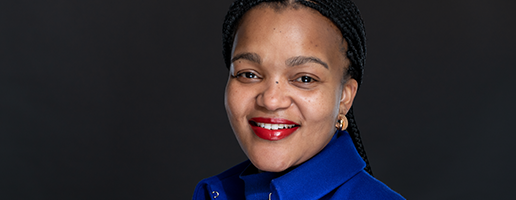
Persistence and faith drive Dr Patricia Sebola to specialise in maternal care
Obstetrician and gynaecologist Dr Patricia Sebola initially self-funded her studies, but with her 2019 Discovery Foundation Sub-Specialist Award, she can sub-specialise in maternal and foetal medicine at the University of Pretoria in two years instead of four.

Hlokomela Women’s Clinic – a safe haven for women
Where do rural women go when they need a pap smear, a mammogram, or suspect they may have breast cancer? In the town of Hoedspruit in Limpopo, they go to the Hlokomela Women’s Clinic, where professional nurse Sonja Botha welcomes them with open arms.
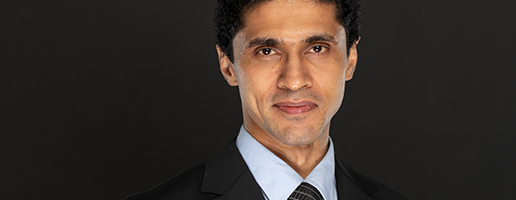
Top cardiothoracic surgeons teach Port Elizabeth based surgeons new skills
Dr Jithan Koshy, with the support of the Discovery Foundation, has invited two experienced cardiothoracic surgeons to teach cardiac surgeons at the Livingstone Tertiary Hospital and Port Elizabeth General Hospital how to do heart surgery on children.